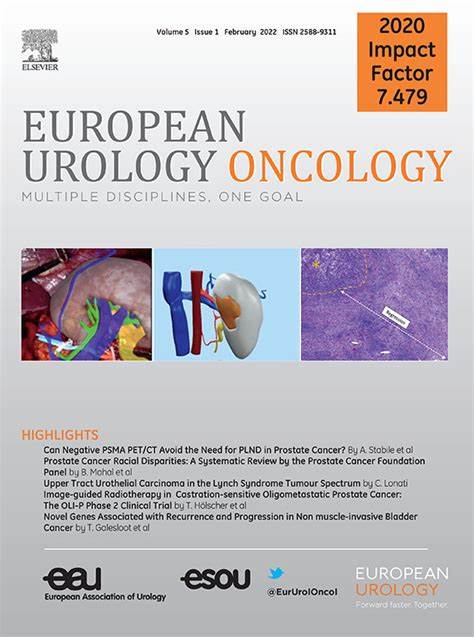生化反应<0.1纳克/毫升可预测前列腺癌患者接受前列腺特异性膜抗原靶向挽救手术后的无治疗生存期
IF 8.3
1区 医学
Q1 ONCOLOGY
引用次数: 0
摘要
背景:在部分少复发前列腺癌(PCa)患者中,使用前列腺特异性膜抗原(PSMA)放射引导手术(PSMA-RGS)进行挽救性手术似乎很有价值:评估术后前列腺特异性抗原(PSA)水平是否较低:这项队列研究评估了在三个三级医疗中心接受PSMA-RGS治疗(2014-2022年)的根治性前列腺切除术后生化复发且PSMA正电子发射断层扫描显示为寡发PCa的患者:结果测量和统计分析:手术后PSA反应为0.2纳克/毫升。Kaplan-Meier和多变量Cox回归模型根据PSA反应评估TFS:在接受评估的 553 例患者中,有 522 例(94%)在 PSMA-RGS 期间切除了转移性软组织病灶。PSMA-RGS 术后 2-16 周,分别有 192、62 和 190 例患者的 PSA 水平达到 0.2 ng/ml。随访 2 年后,TFS 率分别为 81.1%、56.1% 和 43.1%(P 0.2 ng/ml)。在多变量分析中,PSA水平为0.1-0.2纳克/毫升(危险比[HR]:1.9,置信区间[CI]:1.1-3.1)和≥0.2纳克/毫升(HR:3.2,CI:2.2-4.6,P 结论:PSA水平为0.1-0.2纳克/毫升的患者,TFS率为81.1%对56.1%对43.1%:对于接受 PSMA-RGS 挽救手术的患者,生化反应(PSA)较低 患者摘要:我们研究了欧洲三家中心的前列腺癌患者采用前列腺特异性膜抗原靶向放射引导这一特殊方法进行挽救手术的情况。我们发现,术后不久前列腺特异性抗原水平较低的患者较少需要长期接受进一步治疗。本文章由计算机程序翻译,如有差异,请以英文原文为准。
Biochemical Response of <0.1 ng/ml Predicts Therapy-free Survival of Prostate Cancer Patients following Prostate-specific Membrane Antigen–targeted Salvage Surgery
Background
In a subset of patients with oligorecurrent prostate cancer (PCa), salvage surgery with prostate-specific membrane antigen (PSMA) radioguided surgery (PSMA-RGS) seems to be of value.
Objective
To evaluate whether a lower level of postoperative prostate-specific antigen (PSA; <0.1 ng/ml) is predictive of therapy-free survival (TFS) following salvage PSMA-RGS.
Design, setting, and participants
This cohort study evaluated patients with biochemical recurrence after radical prostatectomy and oligorecurrent PCa on PSMA positron emission tomography treated with PSMA-RGS in three tertiary care centers (2014–2022).
Intervention
PSMA-RGS.
Outcome measurements and statistical analysis
Postsalvage surgery PSA response was categorized as <0.1, 0.1–<0.2, or >0.2 ng/ml. Kaplan-Meier and multivariable Cox regression models evaluated TFS according to PSA response.
Results and limitations
Among 553 patients assessed, 522 (94%) had metastatic soft tissue lesions removed during PSMA-RGS. At 2–16 wk after PSMA-RGS, 192, 62, and 190 patients achieved PSA levels of <0.1, 0.1–<0.2, and >0.2 ng/ml, respectively. At 2 yr of follow-up, TFS rate was 81.1% versus 56.1% versus 43.1% (p < 0.001) for patients with PSA <0.1 versus 0.1–<0.2 versus >0.2 ng/ml. In multivariable analyses, PSA levels of 0.1–0.2 ng/ml (hazard ratio [HR]: 1.9, confidence interval [CI]: 1.1–3.1) and ≥0.2 ng/ml (HR: 3.2, CI: 2.2–4.6, p < 0.001) independently predicted the need for additional therapy after PSMA-RGS. The main limitation is the lack of a control group.
Conclusions
For patients after salvage PSMA-RGS, a lower biochemical response (PSA <0.1 ng/ml) seems to predict longer TFS. This insight may help in counseling patients postoperatively as well as guiding the timely selection of additional therapy.
Patient summary
We studied what happened to prostate cancer patients in three European centers who had salvage surgery using a special method called prostate-specific membrane antigen–targeted radioguidance. We found that patients who had low prostate-specific antigen levels soon after surgery were less likely to need further treatment for a longer time.
求助全文
通过发布文献求助,成功后即可免费获取论文全文。
去求助
来源期刊

European urology oncology
Multiple-
CiteScore
15.50
自引率
2.40%
发文量
128
审稿时长
20 days
期刊介绍:
Journal Name: European Urology Oncology
Affiliation: Official Journal of the European Association of Urology
Focus:
First official publication of the EAU fully devoted to the study of genitourinary malignancies
Aims to deliver high-quality research
Content:
Includes original articles, opinion piece editorials, and invited reviews
Covers clinical, basic, and translational research
Publication Frequency: Six times a year in electronic format
 求助内容:
求助内容: 应助结果提醒方式:
应助结果提醒方式:


